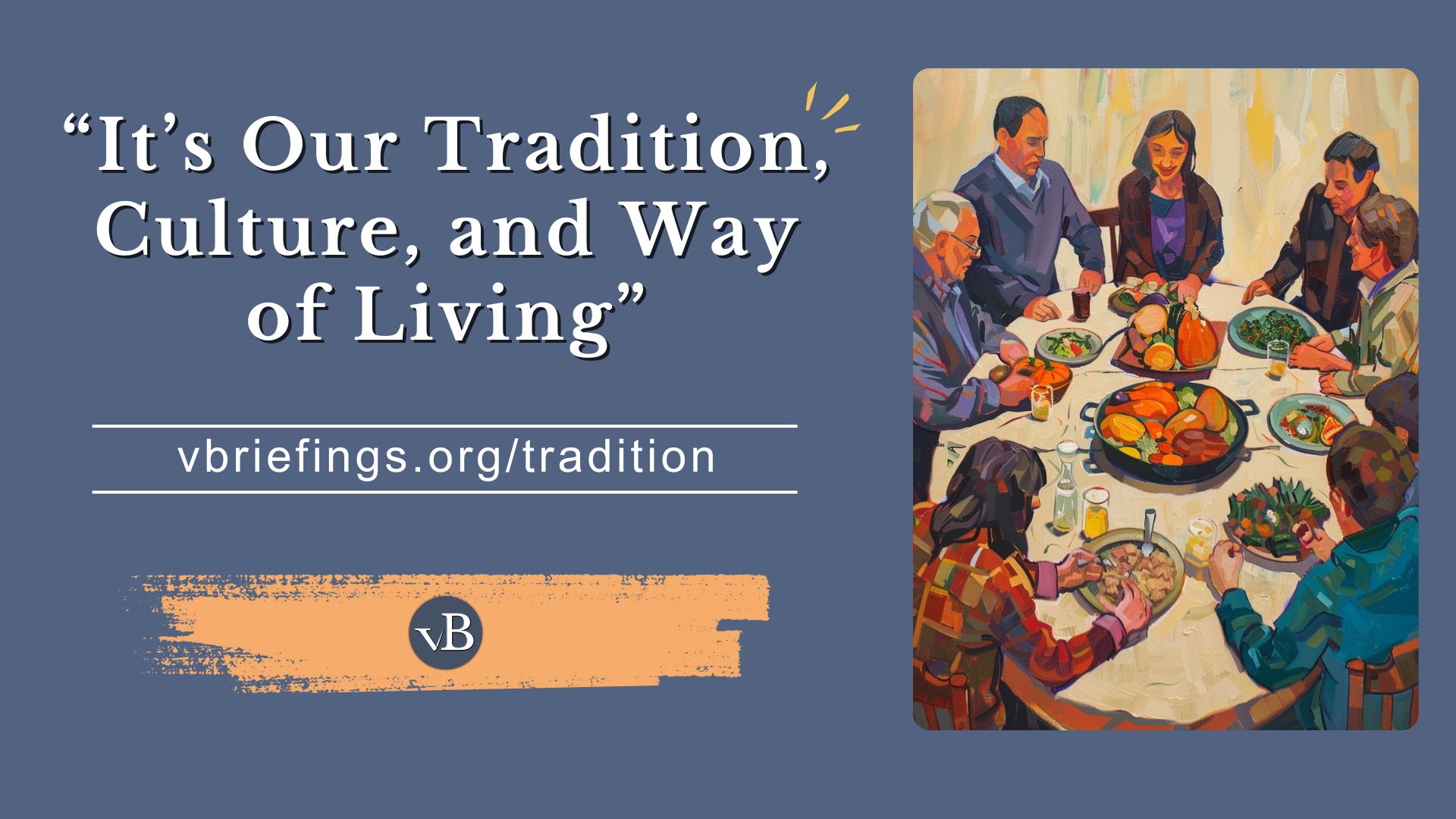Preface
Briefing description and more.
Several points to consider regarding the “tradition and culture” objection to veganism and animal rights.
Companion Videos
How to use companion videos
Videos may be posted on multiple social media platforms, and you can share them on each platform according each platform’s conventions.
Share this Briefing
Social Media Sharing Image
This image will be used when sharing the briefing on a social media platform. You can see all social sharing images in the grid view.

How to share this briefing
Click on the icon for the platform on which you wish to share. What happens next depends on the platform, but generally a popup will appear, letting you add your own text as you share.
Briefing Meta
Metrics
Note: we will publish additional briefings after completing flashcards and presentation slides for selected briefings.
Counts:
| Main Text | |
| Key Points | 4 |
| Counterclaims | 0 |
| Supplementary | 2 |
| Further Study | 6 |
| Footnotes | 3 |
| Media & Advocacy | |
| Advocacy Notes | 12 |
| —Socratic Questions | 20 |
| Flashcards | 0 |
| Presentation Slides | 0 |
| Memes & Infographics | 0 |
| Companion Videos | 0 |
Other Meta:
Date Posted:
Last Edited:
Edit Log:
Key Points Links
Loading…
Help Us Improve
Please send your suggestions for improvements, or report any issues with this briefing to team@vbriefings.org
We appreciate that you are taking the time to help up improve. All suggestions and reports will be carefully considered.
Summary
A concise summary of the briefing (see below for citations).
Tradition and culture, while providing stability, have often been used to justify unethical practices–such as slavery and the subjugation of women–that are no longer considered acceptable. Long-standing practices are not justified simply by their persistence, especially when they cause harm. In contrast, veganism aligns with core values like fairness, justice, compassion, and nonviolence, reflecting the ethical ideals many cultures aspire to uphold.
Context
Places this topic in its larger context.
Appeals to tradition and culture pose significant challenges in the realm of animal ethics because they are so ingrained in our psyche.
Logically, however, such appeals are easy to counter and can be done so on the basis of reason alone. Such responses need not be accompanied by research and citations.
Key Points
This section provides talking points.
We are not justified in doing something just because we have been doing it.
Human history is abundant with examples of injustices that have been defended with an appeal to tradition and culture, including the subjugation of women, slavery, discrimination against the LGBTQ+ community, and female genital mutilation.
While tradition and culture may serve the useful purpose of providing stability and grounding to a group, they should not blindly perpetuate injustices.
We should not confuse tradition and culture with ethics. The fact that a practice is culturally acceptable does not mean it’s morally acceptable.
The length of time we have been engaging in a practice does not exonerate the practice.
An appeal to tradition and culture is often accompanied by an assertion that we have been engaging in a practice for hundreds or thousands of years.
If a practice is ethically problematic, then the longer the practice has been engaged in, the more harm it has caused.
We can’t undo the past, but we can minimize our personal contribution to the problem now and in the future by going vegan.
The fact that a practice is a way of living is not pertinent.
That a practice has become a way of living makes it more difficult to dislodge, but if the practice is unethical, it does not diminish the need to dislodge it.
We have other cultural values that are consistent with the values of veganism.
The idea behind veganism is that we should not unnecessarily harm animals, a belief that almost everyone holds, and a belief that is a feature of our culture.
The values that veganism embodies—fairness, justice, compassion, and nonviolence—are also consistent with our culture.
The fact that we don’t always live up to those values does not mean we shouldn’t try to live up to them.
Our values are strengthened every time someone goes vegan.
Counterclaims
Responses to some yes but retorts.
Counterclaims are often not included in objection-type briefings because the objection itself functions as a form of counterargument.
Supplementary Info
Additional information that may prove useful.
A note on how cultural values are transferred:
- “Primary cultural values are transmitted to a culture’s members by parenting and socialization, education, and religion. There are also secondary factors that affect ethical behavior. They include differences in the systems of laws across nations, accepted human resource management systems, organizational culture, and professional cultures and codes of conduct.”1
Further Study
Sources providing a deeper understanding of the topic or related topics.
Other Resources
Culture, Religion and Tradition Do Not Justify Human Rights Abuse discusses the stance of the International Humanist and Ethical Union (IHEU) at the United Nations, arguing that cultural and religious traditions should not be used to justify human rights abuses.2
The Misuse of Culture explores how cultural narratives can be manipulated to justify unethical practices and the implications for social justice.3
Advocacy Resources
Information to help with outreach and advocacy.
Note: we will publish additional briefings after completing flashcards and presentation slides for selected briefings.
Share This Briefing
Cloned from the Preface Section on page load.
Companion Videos
Cloned from the Preface Section on page load.
Memes and Infographics
No images found.
How to use Memes and Infographics
To sequence through all memes and infographics on this page, click on any image than use the arrow keys or the arrow buttons to show next and previous images.
To share a meme or infographic, right click on the image and choose download or save as. Then upload the image to the platform of choice.
Presentation Slides
Slides not available.
How to Use the Presentation Slides
You can view the slideshow full screen by clicking on the first link above.
To use Canva presenter mode, view the speaker notes, or download the slides as PowerPoint, login to Canva (the free account works) and follow the Full Canva Link provided above.
To copy this presentation to your own Canva project, use the Full Canva Link provided above, then select File->Make a Copy from the upper left. You can build your own unique presentation from multiple briefings by copying the presentation from each briefing and then building another presentation from the copied presentations.
Flash Cards
We partner with Brainscape because of their excellent features for learning. You will need to create a free Brainscape account to study the cards.
Go to Flash Cards: This will take you to a list of decks.
About Flash Cards and Brainscape
Flash cards are here to help you commit important facts and concepts in this briefing to memory.
In Brainscape, there is one deck for each briefing. You can study more than one deck at a time. Brainscape uses spaced repetition to promote memory retention. It is “the secret to learning more while studying less.”
You can study using your browser, but Brainscape also has a free mobile app that makes learning anywhere easy.
Socratic Questions
Socratic-style questions are embedded in the Advocacy Notes below, and shown in italics.
These are open-ended, thought-provoking questions designed to encourage critical thinking, self-reflection, and deeper understanding. They are inspired by the Socratic method, a teaching technique attributed to the ancient Greek philosopher Socrates, who would ask his students probing questions rather than directly providing answers.
The goal is to help people examine their beliefs, clarify their thoughts, uncover assumptions, and explore the evidence and reasoning behind their ideas.
Advocacy Notes
Tips for Advocacy and Outreach
General Tips
This objection is often an impulsive reaction raised without forethought.
People often use tradition and culture as a defense for practices that cause harm, believing that their long-standing nature makes them justified. Your goal is to help them recognize that just because something has been done for a long time does not make it ethical.
Show That Longevity Does Not Justify Harm
Many assume that a practice is acceptable because it has existed for generations. Challenge the idea that the length of time a practice has been followed determines its morality.
- “If a practice causes harm, does the fact that we’ve been doing it for hundreds or thousands of years make that harm any less real?”
- “Would we excuse slavery, discrimination, or other past injustices just because they were long-standing traditions?”
Why? This forces them to see that longevity does not determine morality.
Expose How Culture Can Perpetuate Injustice
People assume that culture is an unquestionable foundation for behavior. Show that cultural traditions have often been used to defend harm.
- “Has there ever been a cultural practice in history that people defended but later realized was unjust?”
- “If a culture promotes values like fairness and justice, shouldn’t we be willing to examine and change traditions that contradict those values?”
Why? This encourages them to see tradition as something that can and should evolve.
Challenge the Idea That Tradition and Ethics Are the Same
People may conflate what is culturally accepted with what is ethical. Help them see the difference.
- “What happens when a cultural practice conflicts with widely accepted ethical principles, such as fairness and nonviolence?”
- “Would we say that a practice is morally acceptable just because many people do it?”
Why? This makes them question whether tradition should override moral reasoning.
Highlight That Culture Evolves Over Time
Some people assume that traditions remain fixed, but history shows they constantly change.
- “What would society look like today if we had refused to evolve past every harmful tradition?”
- “Since culture is always shifting, why should we hold onto traditions that cause unnecessary harm?”
Why? This helps them recognize that progress requires letting go of outdated practices.
Emphasize That Cultural Identity Is Not Dependent on Eating Animals
People often fear that changing a tradition means losing their cultural identity. Show them that culture is more than a single practice.
- “If a culture’s identity is strong, wouldn’t it survive and adapt without the need to cause harm?”
- “If your culture stopped eating animals tomorrow, would that erase all its other rich traditions?”
Why? This helps them see that culture is not defined by specific harmful practices.
Reveal That We Already Choose Which Traditions to Keep or Discard
People assume that tradition should be preserved, but we have already abandoned many past customs.
- “How many outdated traditions—once considered normal—have we rightfully discarded because we recognized their harm?”
- “If we’ve already moved away from traditions like child labor and public executions, why shouldn’t we question traditions that involve harming animals?”
Why? This makes them see that cultural change is not only possible but necessary.
Show That Veganism Aligns With Core Cultural Values
Many cultures value compassion, justice, and nonviolence—principles that align with veganism.
- “If our culture values kindness and fairness, shouldn’t we question traditions that contradict those values?”
- “Does a tradition truly represent our culture if it goes against the principles we claim to uphold?”
Why? This reframes veganism as something that strengthens, rather than threatens, cultural identity.
Address the Fear of Change
People may resist veganism not because they disagree with it but because change feels difficult.
- “If tradition is the only reason to continue a practice, what happens when we realize that the practice no longer aligns with our values?”
- “What’s stopping us from creating new traditions that reflect compassion instead of harm?”
Why? This shifts the focus from preserving the past to shaping a more ethical future.
Show That Individuals Can Lead Cultural Change
Some assume that change must come from society as a whole, but cultural shifts always start with individuals.
- “If no one ever questioned harmful traditions, how would social progress ever happen?”
- “When people stand up against injustice, even when it’s part of their culture, doesn’t that eventually lead to change?”
Why? This empowers them to see themselves as part of the solution.
Leave Them With a Thought-Provoking Question
If they resist, don’t argue—leave them with something to consider.
- “If tradition alone were enough to justify something, would we ever have eliminated any injustice?”
- “When we have the power to shape our culture, why continue traditions that cause unnecessary harm?”
Why? A strong question stays with them long after the conversation ends.
Footnotes
Our sources, with links back to where they are used.
- Pitta, Dennis A., et al. “Ethical Issues across Cultures: Managing the Differing Perspectives of China and the USA.” Journal of Consumer Marketing, vol. 16, no. 3, June 1999, pp. 241. ↩︎
- “Culture, Religion and Tradition Do Not Justify Human Rights Abuse, Says IHEU at UN.” Humanists International, June 22, 2015. Accessed February 9, 2025 ↩︎
- Klitgaard, Robert. “The Misuse of Culture.” Oxford University Press EBooks, December 18, 2020. Accessed 4 July 2024. ↩︎




